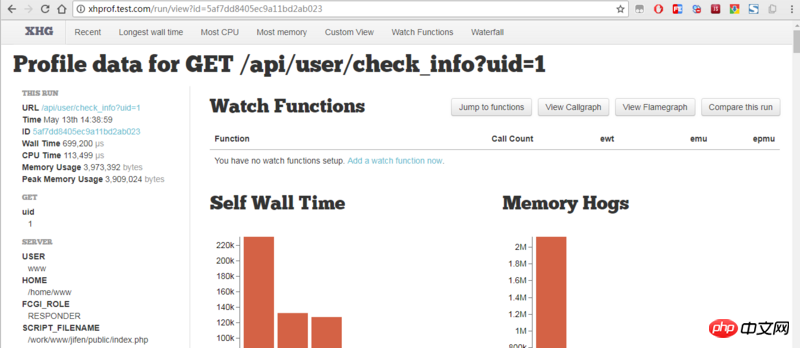
This article mainly introduces the second method of using XHProf to analyze PHP performance bottlenecks. It has a certain reference value. Now I share it with you. Friends in need can refer to the previous article.
We introduced how to analyze PHP performance based on the xhprof extension, record it in the log, and finally use the UI that comes with the xhprof extension to display it on the web. This article will talk about 2 knowledge points:
Use xhgui to replace the default UI interface of xhprof, which is easier to analyze
Use tideways to extend the replacement xhprof extension
xhgui supports XHProf, Uprofiler or Tideways extensions, that is, as long as one of these extensions is installed Just plant it.
In this test, the tideways extension was actually used (no data can be seen in the web after switching to the XHProf extension, the reason is unknown. There is no data when switching to Uprofiler.).
Although xhprof comes from facebook, it has not been updated for a long time. The official source has shown that This package is abandoned and no longer maintained. Tideways is just the opposite. Commercial companies have been maintaining it and actively supporting PHP7. Both extensions are open source. To sum up, I recommend that you choose tideways to analyze the code.
Install tideways extension:
wget https://github.com/tideways/php-xhprof-extension/archive/v4.1.5.tar.gz -O php-xhprof-extension-4.1.5.tar.gz tar xzf /php-xhprof-extension-4.1.5.tar.gz cd php-xhprof-extension-4.1.5 phpize ./configure make && make install
cd /work/ git clone https://github.com/perftools/xhgui.git xhgui
If you need to install the Chinese interface, you can:
git clone https://github.com/laynefyc/xhgui-branch.git xhgui
Then install xhgui dependencies:
cd xhgui php install.php
The installation will take a few minutes, please be patient.
Set the permissions of the cache directory and allow nginx to create files:
chmod -R 777
xhgui has already written all the injection entry files, located at external/header.php, no need for us Manually write the xhprof.inc.php injection file similar to the previous article.
xhgui writes logs to MongoDB, so using xhgui requires installing the MongoDB server. The process of installing and starting the MongoDB server is omitted here.
To improve the performance of MongoDB, you can run the following command to add an index:
$ /usr/local/mongodb/bin/mongo
> use xhprof
db.results.ensureIndex( { 'meta.SERVER.REQUEST_TIME' : -1 } )
db.results.ensureIndex( { 'profile.main().wt' : -1 } )
db.results.ensureIndex( { 'profile.main().mu' : -1 } )
db.results.ensureIndex( { 'profile.main().cpu' : -1 } )
db.results.ensureIndex( { 'meta.url' : 1 } )Similarly, since xhgui is written in PHP, it also needs to read the data in MongoDB, and MongoDB needs to be installed. php client:
pecl install mongodb
Then add configuration in the php.ini file:
[mongo] extension=mongo.so
Check whether the extension is installed successfully:
php -m | grep mongo
Then restart the php-fpm service.
The config directory of xhgui has a config.default.php, copy it to config.php, if the mongodb address is not the default, modify:
'db.host' => 'mongodb://127.0.0.1:27017',
also modify the sampling frequency. The default is 1/100. If testing, change it to true:
'profiler.enable' => function() {
//return rand(1, 100) === 42;
return true;
},In the previous article, we introduced the injected The entry file can be written to php.ini or nginx. I recommend writing it in the nginx configuration. This will only affect the projects corresponding to the nginx, not all projects using the php environment. The entry file uses the injection file that comes with xhgui:
jifen.cc.conf
location ~ \.php$ {
fastcgi_pass 127.0.0.1:9000;
fastcgi_index index.php;
fastcgi_param SCRIPT_FILENAME $document_root$fastcgi_script_name;
fastcgi_param PHP_VALUE "auto_prepend_file=/work/xhgui/external/header.php";
include fastcgi_params;
}We modify xhprof.test.com.conf to:
server {
listen 80;
server_name xhprof.test.com;
#root /work/xhprof/xhprof_html;
root /work/xhgui/webroot/;
index index.php index.html;
location / {
if (!-e $request_filename) {
rewrite . /index.php last;
}
}
location ~ \.php$ {
fastcgi_pass 127.0.0.1:9000;
fastcgi_index index.php;
fastcgi_param SCRIPT_FILENAME $document_root$fastcgi_script_name;
include fastcgi_params;
}
}Restart the nginx service.
We requested the application interface several times, opened the browser and entered http://xhprof.test.com/, you can see:
 Click on a certain request to see the details:
Click on a certain request to see the details: 
The above is the entire content of this article. I hope it will be helpful to everyone’s study. For more related content, please pay attention to the PHP Chinese website!
Related recommendations:
Method 1 of using XHProf to analyze PHP performance bottlenecks
The above is the detailed content of Method 2 of using XHProf to analyze PHP performance bottlenecks. For more information, please follow other related articles on the PHP Chinese website!




